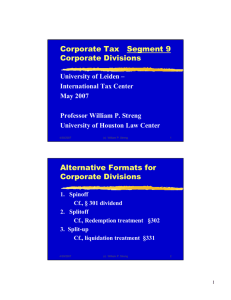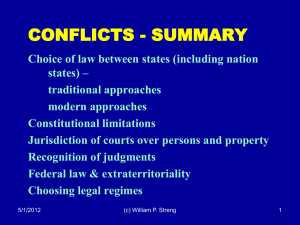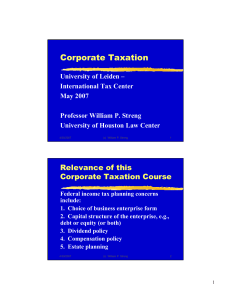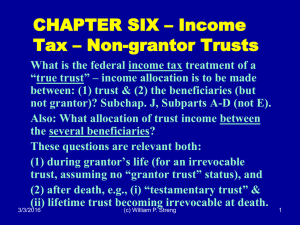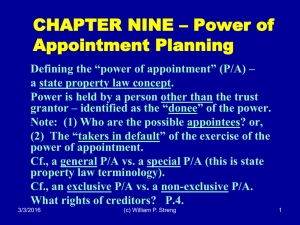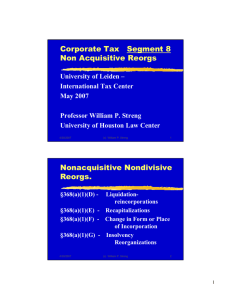CONFLICTOF LAWS SPRING SEMESTER 2012
advertisement
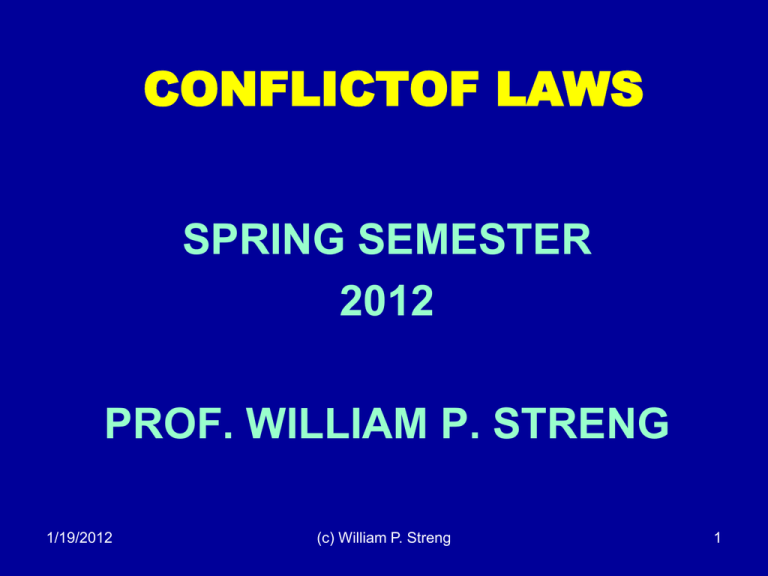
CONFLICTOF LAWS SPRING SEMESTER 2012 PROF. WILLIAM P. STRENG 1/19/2012 (c) William P. Streng 1 INTRO TO CONFLICTS OF LAWS COURSE A “conflict of laws” course concerns the allocation of rights when the laws of multiple jurisdictions overlap in applicability to a situation. The question becomes: how to choose the applicable law for the particular matter? What is the scope of the applicable law? What are the priorities for courts in choosing between the conflicting laws? 1/19/2012 (c) William P. Streng 2 Possible Types of Conflicts between Laws 1) Two states of the U.S. 2) State and federal government - substantive law (cf., 10th Amendment) - diversity jurisdiction 3) Two nation states – transnational laws 4) Other oppositional situations: - conflict with Indian tribal law - conflict with religious laws 1/19/2012 (c) William P. Streng 3 Relevant Substantive Law Conflicts 1) Torts 2) Contracts & business entities/laws 3) Property – e.g., real estate, personal property, intellectual property 4) Family law 5) Government regulation, including U.S. constitutional issues. 6) Taxation – federal and state 7) Transnational & international law 1/19/2012 (c) William P. Streng 4 Consider Cross-Border Conflict Situations 1) 2) 3) 4) 5) 6) 1/19/2012 Personal travel across jurisdictional borders Commerce across jurisdictional borders Family members in different jurisdictions. Personal assets owned in nonresident state Business assets located in other states Internet transactions across borders (c) William P. Streng 5 The Attorney & Client’s Objective To achieve the strategic advantage for the client by choosing the most favorable legal system for: (1) evaluating one’s legal rights (e.g., for purposes of a transaction), and (2) contesting the validity and enforceability of those rights in a litigation mode. 1/19/2012 (c) William P. Streng 6 Important Relevance to Law Practice Situations 1) Choosing the applicable law for a business/investment, etc. planning transaction: a) Substantive law governing the deal b) Choice of law for any dispute resolution 2) Litigation strategy a) Forum shopping b) Choice of procedural law c) Choice of governing substantive law 1/19/2012 (c) William P. Streng 7 Approaching the “Choice Process” Alternatives: 1) Location – the traditional approach – territorial or vested rights analysis. 2) Interest analysis – 1st Restatement 3) Modern approaches – 2nd Restatement 4) Constitutional constraints: - privileges and immunities clause - due process clause - full faith and credit clause 1/19/2012 (c) William P. Streng 8 Problem 1 Male or Female? p.2 Probate dispute (in Kansas) between: 1) decedent’s estranged son of decedent and 2) decedent’s wife(?). Challenge to the validity of the marriage: 1) W - Sex change operation in Wisconsin & change in legal status documentation. 2) Kansas assets; residence in Wisconsin? 3) Legal marriage in Wisc.; not in Kansas. continued 1/19/2012 (c) William P. Streng 9 Problem 1, continued Issues for resolution Which state’s law determines the validity of the marriage? Should Kansas defer to Wisconsin? How determine decedent’s residence at the time of death? Assets in Kansas; much time spent in Wisconsin. Relevance of the “Full Faith & Credit” clause of the U.S. Constitution? Superseding public policy concerns in Kansas? 1/19/2012 (c) William P. Streng 10 Problem 2 p.5 Long Arm of the Law French court judgment against Yahoo – violation of the French penal code. Judgment enforcement action in Cal. Where was the alleged action committed – internet access in France? Could Yahoo block French based access? How successfully? Determined: Yahoo has an obligation to block French based access to this web info. continued 1/19/2012 (c) William P. Streng 11 Problem 2 continued p.5 Enforcement of a foreign penal sanction in the local forum? Should local court determine enforcement based on local “public policy”? Protection under the 1st Amendment? Consider the internet as being without geographical borders – Query: internet gambling site & U.S. laws Public policy re gambling? Use a foreign sub? 1/19/2012 (c) William P. Streng 12 Problem 3 Whose Artwork? p.9 Louisiana resident files “quiet title” suit re painting in Louisiana Fed. Dist. Ct. against Czech Republic resident. Painting is in La. Art originally taken by Nazis. Later sold in Switzerland to NY gallery and then purchased by La. resident. Czech person says he is heir to the confiscated painting & no good title later. Swiss law: good title to stolen property after five years – due diligence, but not for art. New York: thief cannot pass good title – holder 1/19/2012 (c) William P.i.e., Strengnot stolen. must prove the negative, Cont. 13 Problem 3 p.9 Whose Art? continued Louisiana law – protection for property owners – La. Civil Code & owner by prescription after a ten year holding period. U.S. law – Holocaust Victims Redress Act - but no private cause of action (?) International law principles – “moral responsibilities.” A property law question – controlled by which law? A diversity case requiring reference to local property law – but which law? continued 1/19/2012 (c) William P. Streng 14 Problem 3 p.9 Whose Art? continued Use Louisiana “choice of law” rules in the diversity proceeding in Fed. Dist. Ct.? Which law should be applied to determine the substantive property ownership question: Is a private right of action & right of ownership separately created under the federal law? Should the local federal district court create its own substantive law principles to deal with this situation? 1/19/2012 (c) William P. Streng 15 WWWWW wwww 1/19/2012 (c) William P. Streng 16
